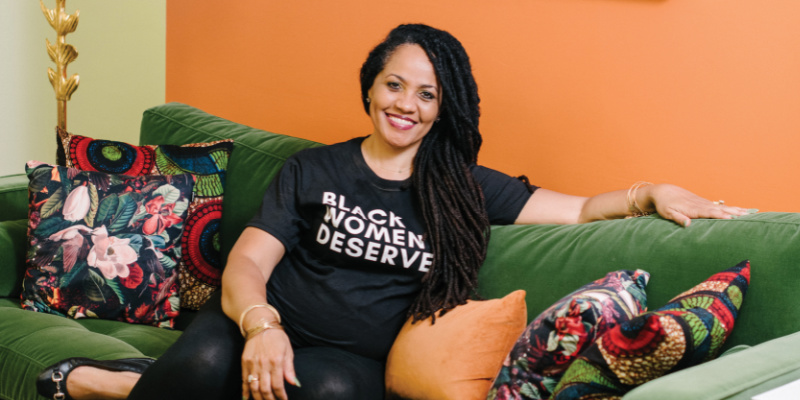By Shayna Mace | Photo by Hillary Schave
In 2019, BRAVA’s feature titled “Empowering Mothers and Saving Babies” detailed how Madison-area Black women were leading the way toward lower infant mortality rates.
Between 2019 and 2021, the Black infant mortality rate was 13.2 per 1,000 live births, compared to 4.4 per 1,000 for white babies (courtesy “Wisconsin Data Resource: Birth Outcomes, 2021”). Put simply, the Black infant mortality rate was nearly three times higher. In 2023, that number edged down slightly to 12.8 infant deaths per 1,000 for Black babies. White mortality rates stayed the same at 4.4 per 1,000 live births, according to the Wisconsin Department of Health Services Infant Mortality Dashboard.
The 2019 feature explained: “Changing these statistics is currently the No. 1 health priority of the Dane County Health Council, which includes all four major area health care providers (UW Health, SSM Health, UnityPoint Health – Meriter, and Group Health Cooperative of South Central Wisconsin), along with the Public Health department, United Way, Madison Metropolitan School District and other stakeholders.”
In 2018, The Dane County Health Council enlisted The Foundation for Black Women’s Wellness (FFBWW) and strategic-planning firm EQT by Design to conduct an engagement study on the issue and causes of low Black birth weights as well as infant mortality rates. In 2019 the FFBWW released the “Saving Our Babies” report, which is available on their website.
“This [report was released] after nine months of community engagement with over 300 Black women, men and childbearing-age youth in the Madison Metropolitan School District, along with health care workers and social workers,” explains FFBWW CEO and President Lisa Peyton.
The report identified 10 core themes that “stressed Black family systems” and “are main drivers of inequities in low birth weight and mortality,” according to the Saving Our Babies website page.
The report reinforced a myriad of issues for Black women and families that Peyton already knew.
“We know that at the root of racial birth disparities are many interwoven and complex factors including broken and biased systems of care and services, generational economic insecurity among Black families and chronic stress. This is impacting Black women’s quality of health, their lives and how their health plays out — whether they are pregnant or not — across the lifespan. That contributes to higher chronic illness rates, birth disparities, and earlier deaths. And it’s unacceptable. It’s solvable,” she says.
Based off of the report’s findings, the foundation and EQT By Design proposed a set of strategies, solutions and recommendations, coined the Saving Our Babies Initiative, to the Dane County Health Council to improve healthy outcomes for Black babies.
The first recommendation was to expand the presence of community doulas, says Peyton. In response to this, the FFBWW built the Well Black Doula Partner Collective.
“We found doulas, we recruited them, we formed the powerful collective and we designed the model, the processes and the dual workforce across clinic and community and mobilized it. Now in year three, this has become a very promising standard of care that is demonstrating significant early signs of moving the needle in the right direction,” Peyton explains.
Micaela Berry-Smith, senior program manager of community and maternal and child health Initiatives at the FFBWW (and a doula herself ), says doulas can be a key member of a woman’s care team. Berry-Smith oversees the Well Black Doula Partner Collective and manages the day- to-day services that doula partners provide to patients referred to the foundation by health system partners as part of the Saving Our Babies Initiative.
“The drive to improve maternal health and change the narrative around birth outcomes for Black families has been the foundation of my work as a doula. The historic and ongoing trauma caused by racism — both systemic and interpersonal — plays a significant role in these disparities. Black women need a care team they can trust, and they often need that extra level of advocacy to ensure their voices are heard, their concerns are addressed and they feel safe and empowered throughout their pregnancy and birth,” explains Berry-Smith.
Peyton says another crucial area the report highlighted was the need for streamlined care coordination across health care systems, between clinics and the community to support high-risk patients.
“We asked ourselves, how should that look? How do we design a care coordination system or a tool or a strategy that bridges clinic and community services, that builds a perinatal workforce, that allows us to do powerful screening to identify social determinants of health needs and the proper care?” she says. “So we collaboratively built a model called ConnectRX Wisconsin (Connect RXWI), which merges screening technology with tangible, clinic and community wraparound support, including doula services and community health worker support.”
ConnectRXWI is utilized at all Dane County Health Council partners, including Access Community Health Centers, Group Health Cooperative of South Central Wisconsin, SSM Health, UnityPoint Health – Meriter and UW Health. It begins with a universal screening for social determinants of health during health care appointments.
From there, “Black pregnant women and birthing patients with identified support needs are referred by their care team to community health workers who will connect them with trusted community agencies to gain access to resources like housing and employment assistance and mental health services,” according to a 2022 SSM Health press release.
Patients identified with the highest levels of health risk are offered doula support, coordinated by the FFBWW, for their pregnancy journey. The aim is to reduce pregnancy complications and foster postpartum health.
In the almost three years since ConnectRXWI has been introduced, Peyton says the results are promising.
“We’re seeing that women who are served by ConnectRXWI are bringing babies to term at a higher rate. We’re seeing fewer premature births, longer gestational age, fewer pregnancy complications, fewer medical interventions during the birthing process, higher levels of breastfeeding uptake, lower self-reported levels of postpartum depression and more stabilization around their social determinants
of health needs,” she explains. “There are community health workers that we have placed at clinics and working at FFBWW. So [pregnant people’s] housing, food, transportation and income needs are being met, all while strengthening communication and collaboration between patients, doulas and providers. We’re moving in the right direction to support better maternal [and] child health.””
Peyton explains that placing Black women at the forefront as leaders and catalysts for change and solutions has been another key strategy of the Saving Our Babies Initiative. The FFBWW organized and co-chairs the Black Maternal and Child Health Alliance (BMCHA), a group of advocates and women with lived experience working on maternal and child wellbeing. The FFBWW also has a governing presence on the initiative and informs strategy, implementation and advocacy efforts. On April 17, the FFBWW and the BMCHA will hold their fifth annual virtual Black Maternal Child Health Summit to coincide with Black Maternal Health Week.
“In five years, this has become a national, sought-after space where we are shaping a powerful narrative on how Black women and partners in this movement are driving solutions,” says Peyton.
Much of Berry-Smith’s work also involves keeping the FFBWW at the forefront of these conversations with community partners, as well as managing maternal health outreach programs. Berry-Smith says the FFBWW tracks all of their programs so they can use data-driven insights to continuously improve services.
“All of these efforts aim to create an environment where Black women and families are not only supported in their immediate health needs but are empowered with the tools, resources and knowledge to make informed decisions about their health and wellbeing. Our ultimate goal is to improve health outcomes, reduce disparities and ensure every woman and birthing person has access to quality care and support,” says Berry-Smith.
One exciting development that’s come about because of the foundation’s continuous leadership in the maternal and child health space is their new partnership with Quartz to provide commercially reimbursed doula services to their HMO patients. (Doula services are not typically covered by health insurers.) To support this work, Peyton and Gabe Doyle, the foundation’s chief health initiatives officer, and his team have spent the last year designing and launching UMAMA Birthing Services as another move to expand doula care and to drive sustainable payment pathways for these birth workers.
While the FFBWW has made significant strides in tackling Black maternal and child health, Peyton is clear that there’s still much work to do in the Black women’s health arena. The FFBWW’s Well Black Woman Institute is one way the Foundation is continuing to tirelessly push for progress by educating cohorts of Black women statewide to become leaders and advocates in their own communities. In March, a new group of 18 women will begin training.
“We have come and modeled the way for how an organization led by Black women and efforts led by Black women can be real players in shifting the level of public accountability towards Black women’s health. There are many more Black women’s organizations in Dane County [that have started] since we’ve been here. And I think this is a ripple effect. Black women’s leadership is a key part of the solution of eliminating disparities in Dane County and Wisconsin,” says Peyton.




